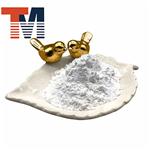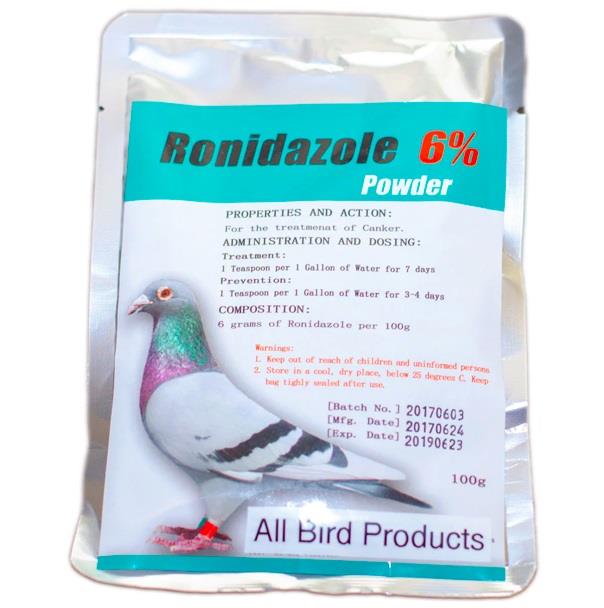Ronidazole: A Potent Antiprotozoal with Carcinogenic Concerns
General Description
Ronidazole is a potent nitroimidazole antibiotic/antiprotozoal that exhibits a unique mechanism of action and is primarily used to treat trichomonal and Giardia infections. It interferes with DNA synthesis in protozoa, ultimately leading to their death. However, its use in food animals is prohibited due to concerns about its carcinogenic properties, and it's not currently FDA-approved for use in the United States. Potential side effects include vomiting and decreased appetite, with more severe cases exhibiting neurological signs. Caution should be taken when using this medication in certain pets, and gloves should be worn when administering it due to its potential carcinogenicity.

Figure 1. Ronidazole
Overview
Ronidazole is a nitroimidazole antibiotic/antiprotozoal closely related to metronidazole. It exerts its toxic effects on protozoa by disrupting their DNA, making it considerably more effective than metronidazole in treating trichomonal infections. Research also suggests its potential effectiveness in treating Giardia in dogs. While drugs from this family are used to treat trichomonal infections in birds, it's crucial to avoid using ronidazole in food animals due to concerns about its carcinogenic properties. When administered orally, ronidazole is well-absorbed. Notably, it lacks FDA approval for use in either humans or animals in the United States, meaning it can only be obtained through compounding pharmacies. In summary, ronidazole is a potent nitroimidazole antibiotic/antiprotozoal that shows promise in treating trichomonal infections and potentially Giardia in dogs. However, its use in food animals is prohibited due to carcinogenic concerns, and it's not currently FDA-approved for use in the United States. 1
Mechanism of action
Ronidazole is an antiprotozoal medication that exhibits a unique mechanism of action. It is primarily used to treat infections caused by certain protozoa, specifically Trichomonas and Giardia. Ronidazole works by interfering with the DNA synthesis process in these parasites. Once administered, Ronidazole is converted into an active form within the protozoa. This active form disrupts the formation of DNA by binding to the DNA helix, leading to the formation of unstable DNA fragments. These unstable fragments are unable to replicate and impair the normal functioning of the protozoa. The exact mode of action of Ronidazole is thought to involve the generation of reactive metabolites that cause oxidative damage to proteins and lipids within the parasite. This oxidative stress disrupts the energy metabolism and other vital cellular processes, ultimately leading to the death of the parasites. It is important to note that Ronidazole's mechanism of action is specific to protozoa and does not affect human cells. This specificity allows for effective treatment while minimizing potential side effects. In conclusion, Ronidazole acts by interfering with DNA synthesis and inducing oxidative stress in protozoa, leading to their death. Its targeted mechanism makes it an effective treatment option for Trichomonas and Giardia infections. 2
Side effects
Potential side effects of ronidazole may include vomiting and decreased appetite. In more severe cases, individuals may experience tremors, severe fatigue, lack of appetite, coordination issues, dizziness, fever, seizures, weakness, collapse, or abnormal behavior. It's important to note that the medication is short-acting and typically stops working within 24 hours. However, its effects may last longer in pets with liver or kidney disease. There are certain risk factors to consider when using ronidazole. It should not be administered to pets with known allergies to nitroimidazoles like metronidazole. Long-term use (over 2 years) in dogs has shown signs of testicular toxicity. Caution should be exercised when using this medication in pets with seizures, and extreme caution should be taken in pregnant animals, ensuring that the benefits outweigh the risks. If use in lactating animals is necessary, a milk replacer should be used. It's worth mentioning that ronidazole has been found to be potentially carcinogenic to humans, as it has caused cancer in mice and increased the incidence of certain cancers in rats. As a precautionary measure, gloves should be worn when administering the medication. The most common side effects are anorexia, nausea, and vomiting. Rare but more serious side effects are neurological in nature and may include weakness, unsteady movements, twitching, and seizures. Typically, discontinuing the drug resolves these neurological signs. However, in some cases, symptoms may initially worsen before improving, and it may take up to four weeks for complete resolution of clinical signs. 3
Reference
1. Rania Gollakner, BS, DVM, MPH. Ronidazole. VCA animal hospitals.
2. Lu AY, Wislocki PG, Bagan ES, Wang RW, Walsh JS, Miwa GT. Mechanism of metabolic activation of ronidazole, a 5-nitroimidazole. Biochem Soc Trans. 1984;12(1):7-9.
3. Barbara Forney, VMD. Ronidazole for Cats. Wedgewood Pharmacy, 2022.
);You may like
Related articles And Qustion
Lastest Price from RONIDAZOLE manufacturers

US $0.00-0.00/Kg2024-04-09
- CAS:
- 7681-76-7
- Min. Order:
- 1Kg
- Purity:
- 99.9%
- Supply Ability:
- 200tons

US $110.00-90.00/kilogram2024-03-01
- CAS:
- 7681-76-7
- Min. Order:
- 1kilogram
- Purity:
- 99%
- Supply Ability:
- 10 tons/per week



